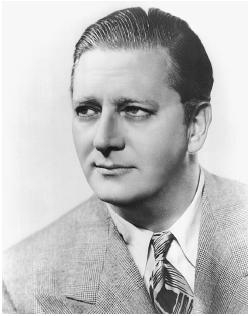Hunt Stromberg - Writer
Producer.
Nationality:
American.
Born:
Louisville, Kentucky, 12 July 1894.
Career:
Sports writer, St. Louis
Times
; early 1920s—publicity director for Goldwyn company in New York;
1921—personal representative for Thomas Ince, Hollywood;
1921—formed Hunt Stromberg Productions: produced first film,
The Foolish Age
; also occasional director:
A Ladies' Man
, 1922; 1925–42—producer and "supervisor" for
MGM; 1942–51—independent producer, releasing through United
Artists; then retired.
Award:
Academy Award for
The Great Ziegfeld
, 1936.
Died:
25 August 1968.
Films as Producer:
- 1921
-
The Foolish Age (Seiter) (+ co-sc)
- 1922
-
Boy Crazy (Seiter); A Ladies' Man (+ d)
- 1923
-
Breaking into Society (+ d + sc); Rob 'em Good (+ d); Snowed Under (+ d); Two Twins (+ d)
- 1924
-
The Night Hawk (Paton); Roaring Rails (Forman); The Fire Patrol (+ d); The Flaming Forties (Forman); The Siren of Seville (+ co-d); The Lightning Rider (Ingraham); A Cafe in Cairo (Withey); Tiger Thompson (Eason)
- 1925
-
Soft Shoes (Ingraham) (+ co-sc); Beyond the Border (Dunlap); The Bad Lands (Henderson); The Crimson Runner (Forman); Paint and Powder (+ d); The Man from Red Gulch (Mortimer); Off the Highway (Forman); Silent Sanderson (Dunlap); The People vs. Nancy Preston (Forman)
- 1926
-
The Torrent (Bell)
- 1928
-
Our Dancing Daughters (Beaumont); White Shadows in the South Seas (Van Dyke)
- 1929
-
Thunder (Nigh); The Bridge of San Luis Rey (Brabin)

- 1930
-
Our Blushing Brides (Beaumont)
- 1931
-
Guilty Hands (Van Dyke)
- 1932
-
Letty Lyndon (Brown); Red Dust (Fleming); The Wet Parade (Fleming)
- 1933
-
Penthouse (Van Dyke); The White Sister (Fleming); Bombshell ( Blonde Bombshell ) (Fleming); The Prizefighter and the Lady ( Every Woman's Man ) (Van Dyke)
- 1934
-
The Thin Man (Van Dyke); Treasure Island (Fleming); The Painted Veil (Boleslawsky); Hide Out (Van Dyke); Chained (Brown)
- 1935
-
Naughty Marietta (Van Dyke); Ah, Wilderness! (Brown)
- 1936
-
Rose-Marie (Van Dyke); Wife vs. Secretary (Brown); The Great Ziegfeld (Leonard); After the Thin Man (Van Dyke); Small Town Girl (Wellman)
- 1937
-
Maytime (Leonard); Night Must Fall (Thorpe); The Firefly (Leonard)
- 1938
-
Marie Antoinette (Van Dyke); Sweethearts (Van Dyke)
- 1939
-
Idiot's Delight (Brown); The Women (Cukor); Another Thin Man (Van Dyke)
- 1940
-
Northwest Passage (K. Vidor); Pride and Prejudice (Leonard); Susan and God ( The Gay Mrs. Trexel ) (Cukor)
- 1941
-
They Met in Bombay (Brown); Shadow of the Thin Man (Van Dyke)
- 1942
-
I Married an Angel (Van Dyke)
- 1943
-
Lady of Burlesque (Wellman)
- 1944
-
Guest in the House (Brahm)
- 1946
-
The Young Widow (Marin); The Strange Woman (Ulmer)
- 1947
-
Lured (Sirk) (exec); Dishonored Lady (Stevenson)
- 1949
-
Too Late for Tears (Haskin)
- 1950
-
Between Midnight and Dawn (Douglas)
- 1951
-
Mask of the Avenger (Karlson)
Film as Story Writer:
- 1926
-
Winning the Futurity (Dunlap)
Publications
By STROMBERG: article—
"The Producer," in Behind the Screen , edited by Stephen Watts, London, 1938.
On STROMBERG: article—
Filme Cultura (Rio de Janeiro), November 1968.
* * *
Hunt Stromberg was one of a handful of supervisory producers who helped create the great MGM films of the 1930s. As a protégé of Irving Thalberg, the boy-genius executive producer at MGM until his death in 1936, Stromberg helped bring together such classics as The Thin Man , Naughty Marietta , and Marie Antoinette . His The Great Ziegfeld earned the Academy Award for Best Picture in 1936.
In the MGM system under Thalberg, a handful of supervisory producers handled the day-to-day operations of the creation of the 52 feature films. Producers developed genre specialties, usually associated with the careers of certain stars. Stromberg achieved remarkable success in the 1930s by first formulating films for Jean Harlow and Joan Crawford, and later with the Jeanette McDonald-Nelson Eddy cycle of musicals and the "Thin Man" series. In short over the decade of the 1930s, including the Great Depression, Stromberg was a money maker of the top rank in Hollywood.
But with Thalberg's death in September 1936, Stromberg began to chafe under a new regime dominated by Louis B. Mayer. (Many other producers also did and the studio slowly went downhill.) Flush with the success associated with the Second World War era, the greatest relative movie-going period in Hollywood history, Mayer permitted Stromberg to leave for a career as an independent producer at United Artists. Mayer refused to meet Stromberg's demands for setting up independent production through MGM, so Stromberg sacrificed guaranteed millions at MGM for the power to run his own shop.
He should have stayed at MGM. He never did as well at United Artists as he had during his salad days under Thalberg. His United Artists debut, Lady of Burlesque , starring Barbara Stanwyck, was a smash, but that can not be said for what followed: The Young Widow , The Strange Woman , and Dishonored Lady . One of the problems was budget constraint. At MGM Thalberg never permitted Stromberg to exceed certain financial limitations. At United Artists Stromberg had no such master and spent millions too much to create box-office failures which could not be written off against other successful studio efforts.
Yet Stromberg never lacked for wealth. This independent minded producer had made himself a rich man through shrewd investments outside the movies. He was an avid horseman and made millions by investing in the Santa Anita and Hollywood racetracks. Thus gradually with failure after failure at United Artists, Stromberg seemed to lose interest in the movie business. He retired, a rich man, to play the role of the Hollywood elder statesman.
—Douglas Gomery
Comment about this article, ask questions, or add new information about this topic: